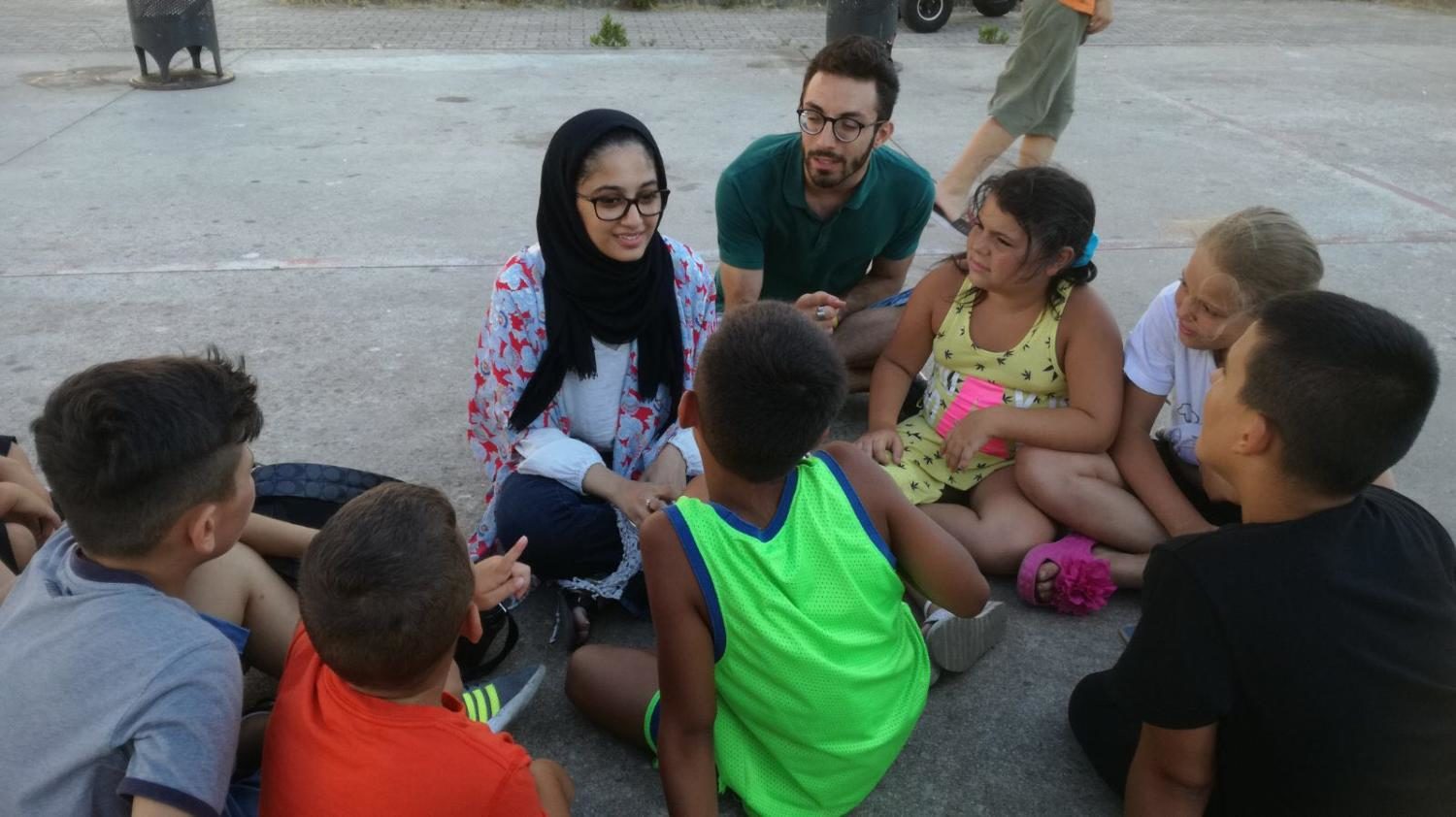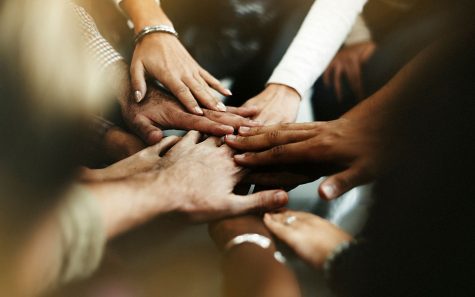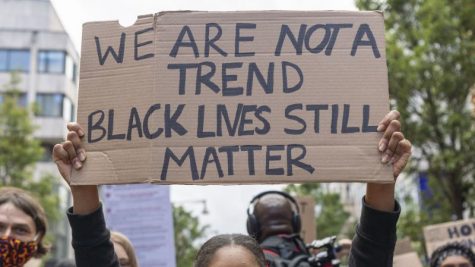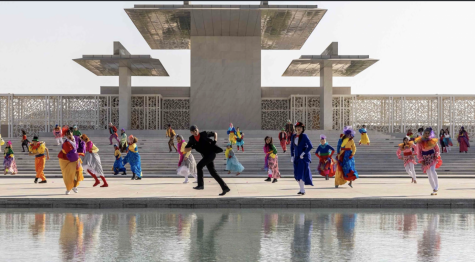Op-ed: Three things I learned from volunteering abroad
Growing up in New York, there was a park next to my school that all the students visited after classes to eat ice cream and relax. It was beautiful in its own simple way. Over the years, however, it got worn down. The trees were dying and the grass was long gone. We had abused the park we loved so much, so the students in my ninth grade class decided to re-plant it. It was an activity that brought us all together and made our park beautiful again. That’s when I learned the value of volunteering and community organizing.
As a high school student, I found solace in volunteering for Ramadan projects and charitable events. So when I went to college I applied for every service learning opportunity I could. Two summers ago I was part of the first batch of Northwestern University in Qatar students to participate in the Global Engagement Studies Institute program, a summer field-study program that gives students the opportunity to volunteer in countries like Bolivia, Dominican Republic, Ghana, India, and Uganda and to work at NGOs that focus on different issues ranging from economic stability in a community to HIV prevention. I interned at an NGO in Kakamega, Kenya, called Support Activities in Poverty Eradication and Health. My classmates and I developed a tailoring project wherein uniforms would be sold to local schools and the proceeds would be used to start a small farm at a daycare center to feed local children.
Then this past summer I received a Wildcat Serve grant to volunteer in Naples, Italy, for three weeks. The Wildcat Serve grant is offered by NU-Q for its students and each grant recipient receives QR 7,500 to plan an independent volunteer trip abroad. The student chooses where to volunteer, so I chose Naples and The Inward Observatory on Urban Creativity, an NGO that focuses on the impact of street art on social change. I thought it would be interesting to see why and how a European country was facing issues that people typically think only non-Western countries experience. The NGO I volunteered at focused on improving the aesthetics of run-down areas in Naples, such as Ponticelli, and encouraging local children to continue their education through the use of art.
Here’s what I learned from my volunteering experiences:
1- One person cannot change the world (and probably shouldn’t want to).
Even before I went, I knew I wouldn’t be making a huge impact during those short periods I spent volunteering in both Italy and Kenya, but I feel that it’s still important to mention this. For instance, just because you’ve taken a class on international development that doesn’t mean you’re going to end poverty in Africa (which, by the way, is an entire continent, not a single country. It seems like people forget that.)
It’s also very important to learn about the history of the country and community you are visiting as well the cultural differences and mindsets. Rudyard Kipling wrote a poem in 1899 called “The White Man’s Burden,” which states that white men have a “responsibility” to “civilize” other races, a concept that was used to justify Western colonialism and imperialism under the premise of “development” and “progress.” This ultimately led to systemic violence and racial issues that we still face today, such as colorism in India or ethnic rivalry in Cyprus.
What I realized, later on, is that I shouldn’t have borderline yelled at the elderly volunteer. She approached me later and began asking me about my religion and, to my amazement, turned out to be a very open-minded and considerate woman.
What does this have to do with volunteering abroad? Well, it means that even though you might have good intentions and want to help people in a different country, you may end up hurting that community. If you don’t do your research and learn to respect their differences, you may be imposing your views and practices on people who belong to a different culture, and who are probably less privileged than you are.
One great example of this is the PlayPump. My classmates and I learned about this famous incident in international development during our weekly meetings with our in-country coordinators in Kenya during my GESI trip. The PlayPump was supposed to be an easy fix for lack of water supply: a one-size-fits-all merry-go-round that, when spun by children, would provide clean water in a tank nearby. It was tested in one community and proved effective, so PlayPump International decided it also would be effective for all different kinds of African communities. Millions of dollars were donated to the project, but it was ultimately a huge failure. Some communities weren’t even asked if they wanted a PlayPump, they just received one. Consequently, many were unmaintained, abandoned and sometimes operated by child labor.
The PlayPump is a great example of outside intervention gone wrong because of lack of in-country research. Development is an extremely slow process that requires a lot of time, effort and study. There is no one-size-fits-all solution to any of the complex issues that plague so many countries around the world.
2- Listen to be surprised, not to argue.
During my second week in Naples, I encountered a very awkward situation. During lunch one day at the volunteer placement center where I was staying, I noticed a group of volunteers who were having a heated political discussion about Donald Trump’s presidency. Most of them were in their early 20s and were left-leaning in their political views.
One 50-year-old volunteer, however, clearly did not feel the same. She defended Trump, saying that he is a good person and that the media exaggerate reports about his alleged gaffes and screw-ups. The woman’s remarks angered all of the younger, more “liberal” volunteers, including myself. I felt attacked. “If he’s saying that all Mexicans are rapists, that all Muslims are terrorists, and that he can grab women by their p*****s, then he’s a bad person,” I replied harshly. All of the younger volunteers commended me.
What I realized, later on, is that I shouldn’t have borderline yelled at the elderly volunteer. She approached me later and began asking me about my religion and, to my amazement, turned out to be a very open-minded and considerate woman. She even bought me a headscarf as a gift because she admired the fact that I wear a hijab. I should have listened to her and what she had to say. It made me realize that I can’t claim to be “open-minded” and then turn away anyone who might believe something that I don’t believe.
I experienced a similar situation when I was in Kenya and was invited to dinner at my classmate’s host family’s house. Everything was going well until my classmate’s host brother began making some very sexist remarks about his wife. He discussed how he felt his wife was his property and that she had no right to refuse him when he wanted to engage in sexual activities. I personally wanted to get up and slap him, but I didn’t because that would’ve been extremely rude. I also felt awkward challenging someone I had just met. So instead I stayed quiet and fell into the trap of thinking that this must be how all Kenyan men operate, and, therefore, I should pity all Kenyan women for being subjected to such oppressive views.
I’ve always hated how some white women and Westerners assume that I’m “oppressed” because I’m Arab. But in this instance, I too became the kind of person who judges people she doesn’t even know. I realized this later on when the man’s wife approached me and whispered, “I let him say what he wants, but I’m the one in control in this family.” I was pleasantly surprised and immediately disappointed in myself for thinking the things that I thought. As an outsider, I did not know Kenyan culture and I had no right to judge an entire population of men and women based on one negative encounter. Even though the man held inappropriate and sexist views regarding women, which I still hope he will correct in the future, it was important for me to engage with his wife and other local women instead of simply judging the situation as an outsider.
3- Don’t judge a book by its cover.
You would think people would know this one by now. I do this to actual books all the time, if I’m being completely honest, but I try my best not to do it to human beings.
For instance, during my second week in Naples, there was a public protest because a young man died of appendicitis. The deceased young man was a former refugee from the Ivory Coast. According to media reports, no ambulance would come pick him up, and when he asked a police officer on the street to help him get to a hospital, he was turned away. Why? Because he was black. He died a few hours after that of something that could have easily been taken care of, had it not been for the deadly racism he encountered.
Most people think of Europe as a continent full of “progressive” people (which, by the way, is a completely loaded term. What does “progressive” even mean and who gets to decide what is progressive and what isn’t?), but in reality, racism is alive and well everywhere. A simple act of denying someone a service – a public service even, which everyone is supposedly entitled to – can and does in fact sometimes end in death and sorrow. No one deserves to die or to be mistreated because of the color of their skin, religion, ethnicity, sexual orientation etc. We keep saying that, but it seems like no one is listening.
Obviously, I have learned a lot more than these three things, but these are the most important ones that I encountered during my time as a volunteer.
At the end of the day, we’re all human beings. Let’s try to remember that.

















